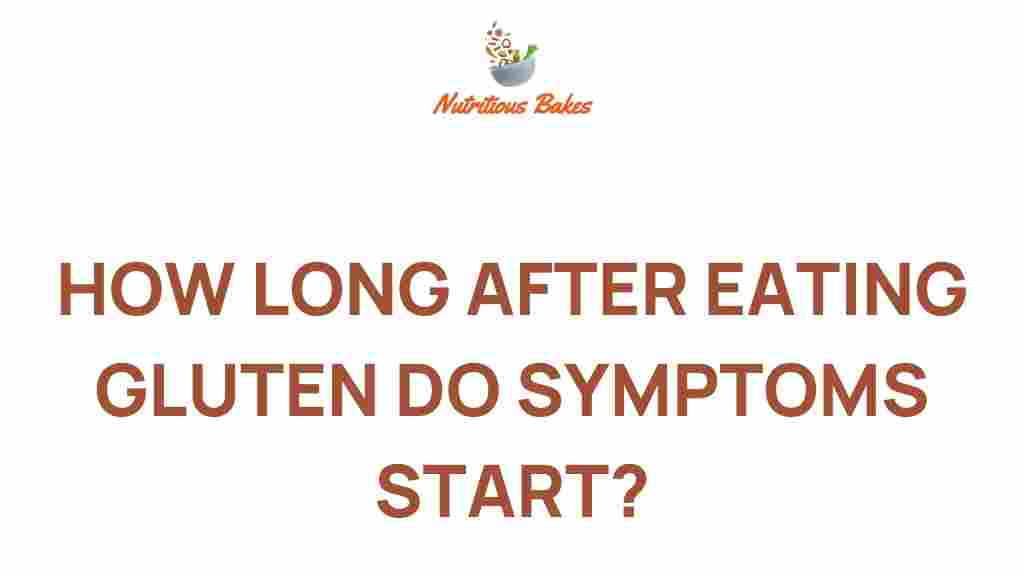Unraveling the Mystery: How Long After Eating Gluten Do Symptoms Begin?
Understanding the timeline of gluten symptoms is crucial for those who suspect they might have celiac disease or gluten sensitivity. Many individuals grapple with food intolerance, often unaware that their digestive issues may stem from gluten consumption. This article will explore the health impact of gluten, the symptoms associated with celiac disease, and provide dietary advice for managing gluten sensitivity effectively.
What is Gluten and Why Does It Matter?
Gluten is a group of proteins found in wheat, barley, and rye. For many, it is a harmless part of the diet, but for those with celiac disease or gluten sensitivity, gluten can trigger a range of unpleasant symptoms.
Celiac Disease and Gluten Sensitivity
Celiac disease is an autoimmune disorder where the ingestion of gluten leads to damage in the small intestine. Symptoms can vary widely, making diagnosis challenging. Gluten sensitivity, on the other hand, refers to a condition where individuals experience gastrointestinal and non-gastrointestinal symptoms after consuming gluten, but without the autoimmune response seen in celiac disease.
How Long After Eating Gluten Do Symptoms Begin?
The timeline for the onset of gluten symptoms can differ significantly among individuals, depending on various factors, including the severity of their condition, the amount of gluten consumed, and personal digestive health. Here’s a breakdown of how gluten symptoms typically manifest:
Immediate Reactions (0-2 Hours)
- Nausea and Vomiting: Some people may experience nausea within hours of gluten ingestion.
- Abdominal Pain: Cramping and pain can occur soon after eating gluten-containing foods.
Short-Term Symptoms (2-24 Hours)
- Bloating: Many individuals report significant bloating and gas within a few hours to a day after consuming gluten.
- Diarrhea or Constipation: A change in bowel habits can often occur within this timeframe.
- Fatigue: Feeling unusually tired or fatigued can also be a short-term symptom.
Delayed Reactions (24-72 Hours)
For some, symptoms may not appear until a day or two after consuming gluten. This can include:
- Headaches: Many people report migraines or tension headaches as a delayed response.
- Joint Pain: Inflammation and pain in joints may arise days after gluten consumption.
- Skin Rashes: Conditions like dermatitis herpetiformis, an itchy skin rash, may develop after gluten exposure.
Factors Influencing the Timeline of Gluten Symptoms
Several factors can influence how quickly gluten symptoms appear:
- Individual Sensitivity: Each person’s immune system and digestive health are unique, impacting how they react to gluten.
- Amount of Gluten Consumed: Larger amounts of gluten may lead to quicker and more severe symptoms.
- Overall Health: Pre-existing health conditions can exacerbate gluten symptoms.
Understanding the Health Impact of Gluten
The health impact of gluten can be significant, particularly for those with celiac disease. Here are some common consequences:
- Nutrient Deficiencies: Damage to the intestines can lead to malabsorption of nutrients like iron, calcium, and vitamins.
- Bone Health Issues: Individuals with celiac disease may be at higher risk for osteoporosis.
- Increased Risk of Other Autoimmune Disorders: There is a correlation between celiac disease and other autoimmune conditions.
Long-Term Effects of Untreated Gluten Sensitivity
Ignoring gluten sensitivity can lead to chronic health issues, including:
- Chronic fatigue
- Depression and anxiety
- Persistent digestive problems
Diagnosing Celiac Disease and Gluten Sensitivity
If you suspect you have celiac disease or gluten sensitivity, it is important to seek professional medical advice. A healthcare provider may recommend:
- Blood Tests: These can help detect antibodies indicative of celiac disease.
- Biopsy: A small intestine biopsy may be performed to assess damage caused by gluten.
- Elimination Diet: Removing gluten from your diet and monitoring symptoms can help identify gluten sensitivity.
Dietary Advice for Managing Gluten Sensitivity
Here are some tips for managing gluten sensitivity effectively:
- Read Labels: Always check food labels for gluten-containing ingredients.
- Choose Whole Foods: Focus on naturally gluten-free foods like fruits, vegetables, and lean proteins.
- Consider Gluten-Free Grains: Quinoa, rice, and corn are excellent alternatives to wheat.
- Avoid Cross-Contamination: Be cautious in kitchens where gluten is present to avoid cross-contamination.
Supplementation for Nutrient Deficiencies
Consider consulting a healthcare provider about supplements if you have nutrient deficiencies due to celiac disease:
- Iron supplements for anemia
- Calcium and vitamin D for bone health
- B vitamins for energy and overall health
Troubleshooting Common Issues
If you continue to experience symptoms despite following a gluten-free diet, consider these troubleshooting tips:
- Consult a Dietitian: A registered dietitian can provide personalized advice and help identify hidden sources of gluten.
- Keep a Food Diary: Tracking what you eat and your symptoms can help pinpoint triggers.
- Evaluate Other Food Intolerances: You may have additional food intolerances that are causing your symptoms.
The Importance of Wellness and Support
Maintaining wellness is crucial for those with gluten sensitivity or celiac disease. Connecting with support groups, both online and in-person, can provide valuable resources and a sense of community. For further information, visit this helpful resource.
Conclusion
Understanding how long after eating gluten symptoms begin is essential for managing gluten sensitivity and celiac disease. The timeline can vary significantly among individuals, with symptoms potentially arising immediately or delayed by days. By recognizing these symptoms and seeking appropriate medical advice, individuals can take control of their health and make informed dietary choices.
For anyone navigating the complexities of gluten intolerance, the journey to wellness can be challenging but also rewarding. Remember to prioritize your health, seek support, and embrace a gluten-free lifestyle to enhance your well-being.
For more information on gluten and its effects on health, do check out this external link.
This article is in the category Diet and created by NutritiousBakes Team
